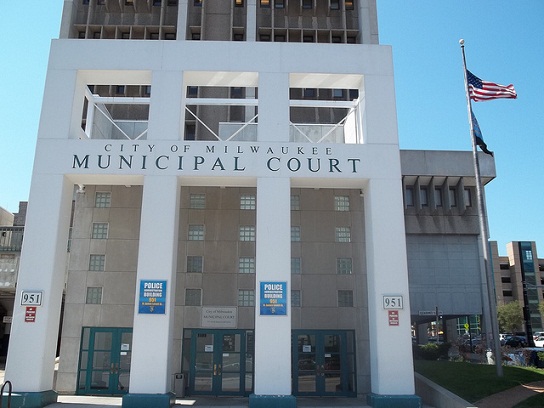Will City Reform Municipal Court?
Too many judges, indigent defendants treated badly, reform needed.
It was Henry Maier, the city’s longest serving mayor (1960-1988), who had the idea for creating the Milwaukee Municipal Court. Maier was always savvy about grabbing state revenue for the city, and realized the minor tickets issued by Milwaukee Police, which were then processed in the state court system, could be a revenue source. And thus the Milwaukee Municipal Court was created in 1975.
Today there are three municipal judges handling all these minor cases — unpaid parking fines, traffic cases, disorderly conduct, trespassing in a building, vandalism — and the court has been something of a cash cow for the city. As recently as ten years ago, the income over expenses was $5 million, Ald. Terry Witkowski estimates, a welcome payout for a city whose revenue structure is increasingly challenged, as the Public Policy Forum has concluded.
But that can be an ugly way to earn a profit. As a study of the court by the UW-Milwaukee Employment & Training Institute found, many defendants are often jailed for failure to pay fines assessed by the court. From 2008-2013, the study found, 9,277 individuals did some jail time for failing to pay their municipal citations, and 78 percent were African American, 84 percent men, almost half from the city’s five poorest zip codes, the majority unemployed. The court seemed to be operating like a Dickensian debtors prison, as I wrote in 2015.
Witkowski was incensed by the court’s unwillingness to use community service and avoid using jail time and drivers license suspensions (which make if difficult for people to get to work) to enforce the collection of fines. “If they (judges) continue to be non-responsive I would consider legislation that would abolish and then recreate municipal court,” he told me back in 2015.
Under the law, judges are required to inform indigent defendants they have the right to work off a fine through community service, but the judges routinely failed to do so, as Gretchen Schuldt and the Wisconsin Justice Initiative found.
The controversy over this issue led to three candidates challenging incumbent Judge Valarie Hill, with the challengers criticizing her for not doing enough to make sure defendants knew their legal rights and were treated with respect. But Hill won reelection.
Meanwhile, Witkowski asked the city comptroller to do a study of the court’s revenue structure, which found the annual net income had dropped by several million in the last decade. The main reason for this is the policy of Milwaukee Police Chief Ed Flynn to deemphasize issuing tickets even as police ramped up traffic stops and field interviews: tickets issued dropped from 110,000 in 2008 to 48,359 in 2014. They have probably declined further since then.
According to John Ledvina of the city Legislative Reference Bureau, in 2011, the Muni Court had expenses of $3.4 million and revenue of $6.8 million, generating a net income of $3.4 million, but the proposed 2018 budget projects just $3.9 in revenue and $3.1 million in expenses, leaving a net income of only $800,000.
Given the huge decline in cases for the court, Witkowski offered a budget amendment to reduce the court from three judges to two, by eliminating the position then held by Hill. (The change must be made when an official’s term is up and Hill was about to run for reelection.) “I lost handily on that,” Witkowski says, “there was no taste on the council for eliminating that position.”
One reason, a city insider says, is that African American members of the council opposed the change. But Ald. Michael Murphy says most white council members were reluctant to make the change as well. He expects the police might start issuing more tickets, what with pressure on Flynn to make changes in his policing policies.
Meanwhile Schuldt’s group came up with a solution to defendants not being told their rights: provide legal representation for them. Her group met last year with Murphy, who was then chair of the Common Council’s Judiciary & Legislation Committee. (He has just been removed from that position, as my colleague Jeramey Jannene reported yesterday.)
Murphy oversaw the release of an RFP to the legal community asking for attorneys to propose what they could do for that amount of money, and Murphy, Municipal Court Judge Derek Mosley and staff of the city’s Community Block Grant program will review the proposals submitted. (The deadline for proposals is tomorrow.)
The $50,000, Murphy says, is enough to set up a pilot program and see what it accomplishes. “This will create a fairer program and benefit everyone in the long run. We have so many people who don’t show up for municipal court, have bench warrants or get their licenses suspended, and simply can’t deal with this process.”
Of course the city budget for this year is so tight that Mayor Barrett has proposed closing six fire stations. And Murphy has been replaced by Ald. Mark Borkowski as head of the Judiciary committee. Will that endanger money allocated last year but scheduled to be spent in the coming year? Murphy is confident that won’t happen. For the sake of the thousands sent to county jail for inability to pay a fine, I hope he is right. If you measure a government on how well it treats its poorest citizens, the municipal court is long overdue for reform.
Correction: This story originally and erroneously said all three municipal court judges are black. Derek Mosley and Valarie Hill are, but Judge Phil Chavez is Hispanic.
If you think stories like this are important, become a member of Urban Milwaukee and help support real independent journalism. Plus you get some cool added benefits, all detailed here.
Political Contributions Tracker
Displaying political contributions between people mentioned in this story. Learn more.
- November 12, 2018 - Tom Barrett received $100 from John Ledvina
- July 29, 2017 - Tom Barrett received $100 from John Ledvina
- March 29, 2016 - Michael Murphy received $100 from John Ledvina
- March 28, 2016 - Michael Murphy received $100 from Terry Witkowski
- July 15, 2015 - Tom Barrett received $50 from John Ledvina
Murphy's Law
-
Top Health Care Exec Paid $25.7 Million
 Dec 16th, 2025 by Bruce Murphy
Dec 16th, 2025 by Bruce Murphy
-
Milwaukee Mayor’s Power in Decline?
 Dec 10th, 2025 by Bruce Murphy
Dec 10th, 2025 by Bruce Murphy
-
Total Cost of Foxconn Is Rising
 Dec 8th, 2025 by Bruce Murphy
Dec 8th, 2025 by Bruce Murphy






















Wow! I always wondered why judges bother issuing fines to people who clearly can’t afford to pay them. It always felt like a slap on the wrist to me. I had no idea that such individuals should have also had the opportunity to perform community service if payment wasn’t feasible. I always thought community service had to be specifically ordered by the court.
Thanks for bringing this issue up. Considering the number of people found guilty of municipal issues who are unemployed, I would think judges would bring up community service more often. What a missed opportunity to expose people to opportunities to pick up a skill or to network with potential employers! Those opportunities exist even in a capacity where one is mandated to perform the service.
If truth serum were available, here would be the policy from every corner & angle:
https://youtu.be/3B1IQYD4Uew